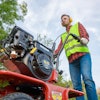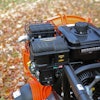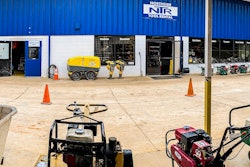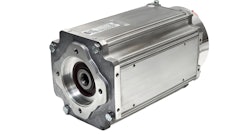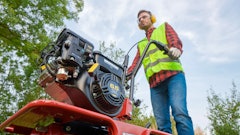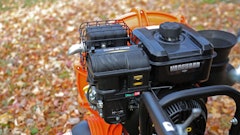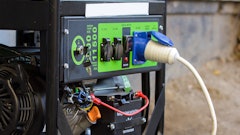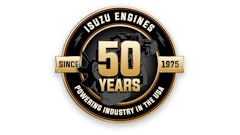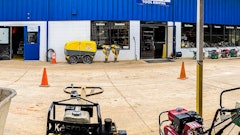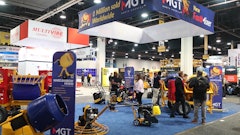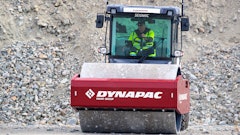
Dylan Rewoldt, director of sales at Vanguard Commercial Engines, shares his insight into the world of small engines of equipment rental.
Rental connected with Rewoldt over email in May 2025.
Q. What is the state of small engines in this country? How has California’s ban on small engines affected the industry?
 Dylan RewoldtVanguard Commercial Engines
Dylan RewoldtVanguard Commercial Engines
California's emissions laws have certainly had an impact on the markets we operate in. While the changes are felt most in California, the entire country seems to be more focused on efficiency — certainly for sustainability reasons but also other factors like fuel costs.
In our experience, though, regulation isn't always the best indicator of adoption. Our customer needs are diverse and we'll continue serving them with diverse, efficient power sources — both gas- and battery-based.
On the engine side, we are committed to leading innovation in gasoline engine technology. We’re doing this by ensuring our engines deliver best-in-class performance, reliability, and compliance for the many users and applications that depend on the unique attributes of internal combustion power. This dedication to our engine customers works in parallel with the expansion of our advanced battery systems. We are committed to supporting OEMs with any power solution required, backed by comprehensive support. This includes competitive warranties and our global service network, to empower all our customers as they navigate this evolving landscape.
Q. Small engines are still a major part of equipment rental. What have been the biggest updates affecting rental stores for their small engine assets?
Small gasoline engines remain a crucial power source of equipment rental fleets, even as electric options expand. We’ve made several important updates focused on benefiting rental stores and their engine-powered assets. At Vanguard, our innovations are aimed at what maximizes value for the rental industry: enhancing durability, ensuring reliability, simplifying maintenance and ultimately lowering the total cost of ownership.
A major focus has been on bolstering engine durability and uptime, which is paramount in the demanding rental environment where equipment is used by various operators. We've engineered our commercial engines, including the Vanguard single-cylinder lineup, with features like our Cyclonic Air Filtration system, which can extend air filter replacement intervals up to an impressive 600 hours. This directly reduces downtime and keeps equipment out earning revenue. Our exclusive TransportGuard technology, which features a 3-in-1 control integrating fuel and ignition shut-off, directly tackles a frequent rental issue of oil and fuel dilution from improper transport. By preventing this common problem, TransportGuard significantly cuts down on unscheduled, costly maintenance and ensures your equipment is consistently ready to rent.
Beyond just durability, we've also concentrated on optimizing performance while reducing ongoing maintenance costs. Inflation and new regulations have significantly driven up the cost of equipment, intensifying the need for efficiency and reliability. In response, we're seeing continued innovation: for example, the increasing integration of Electronic Fuel Injection (EFI) and Electronic Throttle Control (ETC) systems in select Vanguard models, along with the emergence of CAN bus integration in small equipment. These technologies allow for smarter equipment functionality and contribute to enhanced uptime. They also provide rental customers with more reliable starting in diverse conditions, consistent power delivery and improved fuel efficiency throughout the rental period. Many Vanguard engines now also boast extended service intervals. This not only means lower labor costs and less waste but contributes directly to a better total cost of ownership. Ultimately, for rental businesses, the primary focus remains on robust serviceability to keep equipment operational and minimize downtime.
All these advancements are designed to improve the total cost of ownership for your engine-powered fleet. We understand that minimizing downtime and operational expenses is key to profitability in the rental sector. Vanguard stands behind its commercial engines with industry-leading warranties and a robust global service network that helps ensure access to parts, trained technicians and readily available information. Our commitment is to ensure that Vanguard engines continue to be highly reliable, top-performing and profitable assets for your rental business.
Q. How have modern small engines made maintenance easier for rental shops?
Modern small engines have seen several key advancements that make maintenance easier and more manageable for busy rental shops. These improvements take into account the unique demands of the rental environment, where uptime is critical and equipment is used by many different operators.
One of the most significant ways maintenance has become easier is by optimizing maintenance intervals. Many modern engines are now designed with components and systems that allow for longer operational periods between common maintenance tasks. For example, our advanced Cyclonic Air Filtration system can extend replacement intervals up to 600 hours. Similarly, many modern commercial engines require less frequent oil changes, directly reducing labor and associated costs for rental shops.
A key innovation at Vanguard is the TransportGuard system. We launched this on our single-cylinder engines to minimize oil dilution during transport and reduce engine touchpoints, which streamlines maintenance. Its integrated fuel and ignition shut-off directly prevents this common problem, saving shops from a lot of unscheduled, messy work and ensuring equipment is ready for the next rental. Features like low-oil sensors or automatic shutdown systems further help to protect engines from severe damage that could otherwise require extensive and difficult maintenance.
There’s also been a general trend towards improving the overall serviceability of engines. This can include designing engines with easier access to regular service points. For engines equipped with Electronic Fuel Injection (EFI), a technology Vanguard utilizes, there are often enhanced diagnostic capabilities. These systems can help technicians more quickly identify and troubleshoot issues.
Collectively, these general advancements in modern small engine design — longer service intervals, features that prevent common faults and improved serviceability with better diagnostics — all contribute to a significantly easier maintenance experience for rental shops. This means less workshop time, lower operational costs and, ultimately, higher equipment availability for your customers.
Q. What are the latest changes for your company?
Vanguard is committed to continually enhancing our commercial engines. Our recent efforts ensure they deliver top power, efficiency and reliability, and that our customers always receive excellent support.
A prime example of this is the recent introduction of our new Vanguard 300 single-cylinder engine. This 10.0 Gross HP engine (307cc) is engineered for demanding commercial use across a wide variety of applications, from pressure washers and chippers to construction equipment. It embodies our latest advancements and is optimized for cold-weather starting. These innovations mean improved uptime and easier maintenance for users.
More broadly, we're continuously refining our entire engine family for peak performance and durability. We've significantly expanded our EFI/ETC engine lineup. This advanced technology is now available across our Vanguard series, including the single-cylinder, small-block, and BIG BLOCK engines, and we continue to see our OEM partners steadily moving away from carburetors and adopting EFI/ETC technology.
We're also committed to supporting our OEM partners and end-users comprehensively. For instance, our entire Vanguard single-cylinder engine lineup, including the new Vanguard 300, is backed by a three-year commercial limited warranty, with an additional bonus year upon registration. Additionally, we build approximately 85 percent of all our engines in the U.S. and are focused on our commitment to being a USA-made company. These efforts reflect our dedication to providing dependable, high-performing power solutions that meet the tough demands of the commercial and rental markets.
Q. What can we expect on the horizon?
We are heavily invested in the next evolution of engine technology to meet upcoming emissions regulations. This is an incredibly exciting and challenging time in our industry. However, with our 117 years of experience navigating and overcoming challenges, we are fully committed to maintaining our position as the market leader in engine technology.


